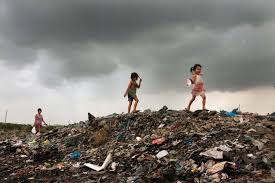E-waste And Children's Health
Around 45 million tons of e-waste, for example, televisions, computers, and phones are created every year and this is increasing. E-waste items contain exorbitant components that are of economic value in the event that they are recycled. However, they additionally contain potentially unsafe substances that might be released directly into the environment. Other unsafe substances might be formed during the recycling process, especially if this happens in the 'casual' sector where modern mechanical processes are not used and where worker protection might be inadequate.
Children are often involved in these processes, exposing them to high quantities of harmful chemicals, for example, lead, mercury, cadmium, and dioxins, a significant number of which can produce adverse neurodevelopmental impacts even at very low exposure levels. Children might be exposed to the settings they live in (network exposures) or by working or going with their parents to the recycling places. E-waste Collection Centre Near Me.
Several United Countries agencies are cooperating through an e-waste alliance to address the e-waste challenge. Activity by WHO and colleagues both at worldwide and nearby level include:
• Increasing the evidence and knowledge base;
• Bringing issues to light and imparting on health impacts, especially in children;
• Building the limit of the health sector to better protect children through exposure reduction;
• Elevating checking of exposures to e-waste;
• Working with other sectors to implement policies and activities that reduce destructive exposures;
• Propelling specific research about e-waste and related health effects.
E-waste items contain exorbitant components that are of economic value in the event that they are recycled. E-waste Collection Centre Near Me.The e-waste network means to establish, further expand, and foster cooperation through a network of experts and international stakeholders in the area of e-waste management by:
Closely planning intervention programs with WHO departments, UN agencies, WHO teaming up centers and other gatherings
Closely teaming up with WHO working together centers, partners, and NGOs and by including further stakeholders. Setting up a stage for exchange as a device to manufacture this network. E-waste Collection Centre Near Me.








0 Comments